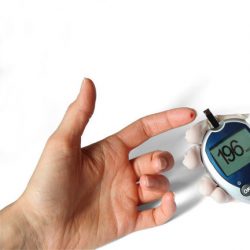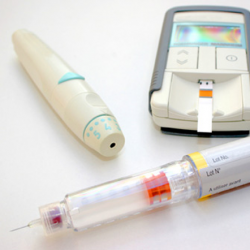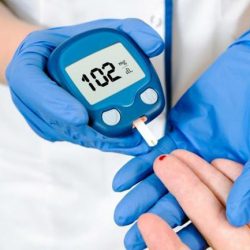Patients treated with a drug widely prescribed for type 2 diabetes can live longer than people without the condition, a large-scale study involving over 180,000 people has shown. The findings indicate that a drug known as metformin, used to control glucose levels in the body and already known to exhibit anticancer properties, could offer prognostic and prophylactic benefits … [Read more...]
Diabetes News

Higher potato consumption linked with high blood pressure: Harvard Medical School Study
Higher intakes of boiled, baked, or mashed potatoes, and French fries is associated with an increased risk of developing high blood pressure (hypertension) in adult women and men, according to a study published by The BMJ today. The US-based researchers suggest that replacing one serving a day of boiled, baked, or mashed potatoes with one serving of a non-starchy vegetable … [Read more...]
Germs can cause type 1 diabetes: Cardiff University Study
Germs could play a role in the development of type 1 diabetes by triggering the body's immune system to destroy the cells that produce insulin, new research suggests. Scientists have previously shown that killer T-cells, a type of white blood cell that normally protects us from germs, play a major part in type 1 diabetes by destroying insulin producing cells, known as beta … [Read more...]
Red wine could counteract negative impact of high fat and high sugar diets: Georgetown University Study
Red wine lovers have a new reason to celebrate. Researchers have found a new health benefit of resveratrol, which occurs naturally in blueberries, raspberries, mulberries, grape skins and consequently in red wine. While studying the effects of resveratrol in the diet of rhesus monkeys, Dr. J.P. Hyatt, an associate professor at Georgetown University, and his team of … [Read more...]
Blood sugar levels closely linked to how our brains respond to the sight of food: University of Washington Study
Our brain's response to the sight of food appears to be driven more by how low our blood sugar level is at the moment than our upbringing or genetics, researchers said at the annual meeting of the Society for the Study of Ingestive Behavior. "The finding suggest our brains have a way to override our genetic inheritance, upbringing and habits to respond to our immediate … [Read more...]
Vitamin D supplements can improve mood in women with type 2 diabetes: Loyola University Study
Loyola University Chicago Marcella Niehoff School of Nursing researchers are recruiting women for a study to determine whether raising blood levels of vitamin D can improve mood in women with diabetes. The study also will examine whether raising vitamin D levels can reduce blood pressure and affect how well women manage their diabetes. Principal investigator Sue M. … [Read more...]
Short bursts of high-intensity exercise does more for type 2 diabetes: University of Western Ontario Study
Short bursts of high-intensity exercise improved cholesterol, blood sugar and weight among Type 2 diabetes patients more than 30 minutes of sustained, lower-intensity exercise, according to research presented at the American Heart Association's Scientific Sessions 2015. Researchers found that after three months of high-intensity exercise in 10-minute bursts done three times … [Read more...]
One injection stops diabetes: A Study
In mice with diet-induced diabetes -- the equivalent of type 2 diabetes in humans -- a single injection of the protein FGF1 is enough to restore blood sugar levels to a healthy range for more than two days. The discovery by Salk scientists, published today in the journal Nature, could lead to a new generation of safer, more effective diabetes drugs. The team found that … [Read more...]
Weight-loss surgery cures diabetes: University of Manchester Study
Scientists at The University of Manchester are a step closer to understanding why diabetes is cured in the majority of patients that undergo gastric bypass surgery. The research, published in the journal Endocrinology, shows the cure is likely to be explained by the actions of specialized cells in the intestine that secrete a cocktail of powerful hormones when we … [Read more...]
Advantages standardizing diabetes treatments
Medical treatment guidelines are suggestions that international organizations such as the American Diabetes Association, the European Society for the Study of Diabetes and the American Association of Clinical Endocrinologists, used to set the tone in the control of the disease and how to apply a better therapy, depending on the physical condition of the person. All guides … [Read more...]
Vitamin D deficiency and type 1 diabetes linked: University of Pennsylvania Study
During the past two decades, vitamin D status, defined as serum concentration of 25-hydroxyvitamin D, has emerged as a predictor of key clinical outcomes including bone health, glucose metabolism, cardiovascular health, immune health and survival. Now, a University of Pennsylvania School of Nursing (Penn Nursing) team, including senior author Terri Lipman, PhD, CRNP, FAAN, the … [Read more...]
Insulin pumps result in better blood sugar control than multiple daily injections in people with type 2 diabetes: University of Caen Côte de Nacre Study
Type 2 diabetes is usually controlled by diet and medication, but most people with advanced disease also end up needing insulin therapy to achieve control of their blood sugar. However, roughly a third of these patients struggle to achieve the right level of blood sugar control with insulin injections many times a day. The growing obesity epidemic is adding to the problem by … [Read more...]
Liver disease risk increased by type 2 diabetes: University of Southampton Study
People with type 2 diabetes are at greater risk of serious liver disease than those without the condition, new research has shown. Researchers warn that hospital admissions and deaths caused by liver disease are likely to rise if cases of type 2 diabetes continue to increase at current rates. The team, involving researchers from the Universities of Southampton and … [Read more...]
Depression, metabolic factors combine to boost risk of developing diabetes: McGill University Study
Depression may compound the risk of developing type 2 diabetes in people with such early warning signs of metabolic disease as obesity, high blood pressure and unhealthy cholesterol levels, according to researchers from McGill University, l'Université de Montréal, the Institut de recherches cliniques de Montréal and the University of Calgary. While previous studies have … [Read more...]
New diabetes treatment: University of Birmingham Study
Researchers have developed a light-activated tool to show how drugs need to be adapted to combat type 2 diabetes. The study, published in Angewandte Chemie, provides insight into the signalling process of receptors in cells. The team behind the research believe their findings could pave the way for a new generation of anti-diabetic drugs that are activated by the presence … [Read more...]
Number of adults with diabetes reaches 422 million worldwide, with fastest increases in low and middle income countries
Since 1980, the number of adults with diabetes worldwide has quadrupled from 108 million to 422 million in 2014, according to a new study published in The Lancet. The findings provide the most comprehensive estimates of worldwide diabetes trends to date and show that diabetes is fast becoming a major problem in low and middle income countries. "Diabetes has become a … [Read more...]
Treating sugar addiction like drug abuse
With obesity rates on the rise worldwide and excess sugar consumption considered a direct contributor, the search has been on for treatments to reverse the trend. Now a world-first study led by QUT may have the answer. Neuroscientist Professor Selena Bartlett from QUT's Institute of Health and Biomedical Innovation said the study, which has just been published by … [Read more...]
Soy supplements appear to be safe, beneficial in diabetes: University of Hull Study
Soy protein supplements, which contain natural estrogens, do not reduce testosterone levels in men with Type 2 diabetes who already have borderline-low testosterone, according to a new study. "Because soy contains phytoestrogens that are similar to the female hormone estrogen, it was not known whether consumption of soy could reduce testosterone levels in men with Type 2 … [Read more...]
Blood sugar improves with first gastrointestinal microbiome modulator, NM504: A Study
In adults with prediabetes, a new drug that alters microbial populations and their environment in the gastrointestinal (GI) tract improves glucose tolerance -- the body's response to consuming carbohydrates -- after four weeks of treatment and without a change in diet. The not-yet-named therapeutic, NM504, is the first in a new class of therapies known as GI microbiome … [Read more...]
Sleeve gastrectomy surgery improves diabetes control better than medical care: A Study
Adults with Type 2 diabetes achieve better blood glucose (sugar) control two years after undergoing laparoscopic sleeve gastrectomy than do patients who receive standard medical diabetes care without this weight loss surgery, a new study finds. In addition, 76 percent of surgery patients were able to reduce their use of diabetes medications, compared with only 26 percent of … [Read more...]
Gut microbe levels are linked to type 2 diabetes and obesity: A Turkish Study
People with Type 2 diabetes or obesity have changes in the composition of their intestinal micro-organisms -- called the gut microbiota -- that healthy people do not have, researchers from Turkey have found. The study lends support to other recent reports that have found an association between specific bacterial species in the human digestive system and obesity and diabetes, … [Read more...]
Type 1 Diabetes Cure?
A medication called Verapamil is a common treatment for controlling blood pressure, but researchers have stumbled onto another possible use for it: curing type-one diabetes. A first-of-its-kind trial is now underway, and it could be the cure for what is currently the seventh leading cause of death in the U.S. Joy Myers didn’t always count carbs. And she didn’t always have … [Read more...]
Yogurt consumption reduces the risk of type 2 diabetes: University of Cambridge Study
New research published in Diabetologia (the journal of the European Association for the Study of Diabetes) shows that higher consumption of yoghurt, compared with no consumption, can reduce the risk of new-onset type 2 diabetes by 28%. Scientists at the University of Cambridge found that in fact higher consumption of low-fat fermented dairy products, which include all yoghurt … [Read more...]
Non-traditional risk factors illuminate racial disparities in type 2 diabetes: A Study
Two surprising risk factors -- diminished lung function and low serum potassium levels -- appear to have nearly the same impact as obesity in explaining why African-Americans are disproportionately prone to developing type 2 diabetes, researchers at Duke Medicine report. The finding, published in the February print edition of the Journal of General Internal Medicine, … [Read more...]
Scientists create painless patch of insulin-producing beta cells to control diabetes: University of North Carolina
For decades, researchers have tried to duplicate the function of beta cells, the tiny insulin-producing entities that don't work properly in patients with diabetes. Insulin injections provide painful and often imperfect substitutes. Transplants of normal beta cells carry the risk of rejection or side effects from immunosuppressive therapies. Now, researchers at the … [Read more...]
Genetic code for diabetes in Greenland broken: University of Southern Denmark Study
A spectacular piece of detective work has mapped a special gene variant among Greenlanders which plays a particularly important role in the development of type 2 diabetes. The results have been published in Nature and can be used to improve prevention and treatment options for those genetically at-risk. In collaboration with Greenland researchers from Steno Diabetes Center … [Read more...]
Vitamin A derivative treats type 2 diabetes: University of Montreal Study
At a time when obesity, type 2 diabetes, and their complications are a veritable epidemic worldwide, researchers at the University of Montreal and CHUM Research Centre (CRCHUM) recently demonstrated the potential of retinoic acid (RA), a derivative of Vitamin A, in treating obesity and type 2 diabetes and preventing their cardiovascular complications. The findings … [Read more...]
Activating brown fat tissue: a new therapy for obesity and diabetes: University of Cologne Study
In recent decades, obesity has become a global problem. The disease goes hand in hand with a dramatic increase in the proportion of body fat. Researchers from the Max Planck Institute for Metabolism Research and the Cologne Cluster of Excellence in Cellular Stress Responses in Aging-associated Diseases (CECAD) at the University of Cologne have now succeeded in inhibiting a … [Read more...]
Delivering the difficult news of a type 2 diabetes diagnosis: A Study
"You have Type 2 diabetes." When you deliver this news to patients, many are surprised, even shocked. Research shows some are so busy processing this unwelcome information, they have a difficult time focusing on what you are saying -- and about a fourth of them wonder whether it's even true. And yet you have a short time to ensure they understand just how serious the disease … [Read more...]
Improving diet quality reduces risk for type 2 diabetes: Harvard School Study
Improving the overall quality of one's diet helps to prevent type 2 diabetes, independent of other lifestyle changes, according to a study presented at the American Diabetes Association's 74th Scientific Sessions®. The study, by researchers at the Harvard School of Public Health, found that those who improved their diet quality index scores by 10 percent over four years -- … [Read more...]
- « Previous Page
- 1
- 2
- 3
- 4
- 5
- 6
- …
- 24
- Next Page »

































